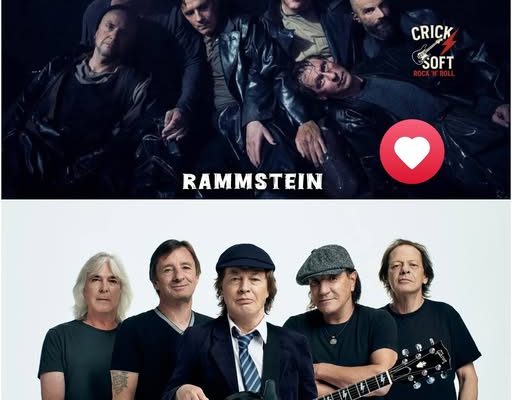When it comes to legendary rock and metal bands, two names always stand tall in the conversation: Rammstein and AC/DC. Both have carved their own massive empires in the music world, inspiring generations, breaking records, selling out stadiums, and proving that rock and metal are not just genres but lifestyles. AC/DC, born in Australia in the 1970s, are often considered the very definition of hard rock. With Angus Young in his schoolboy uniform, guitar riffs that defined a generation, and unforgettable tracks like “Back in Black,” “Highway to Hell,” and “Thunderstruck,” AC/DC created a style that was simple yet effective, hard-hitting yet catchy, and eternally powerful. On the other hand, Rammstein, hailing from Germany, came decades later, but their impact on heavy music is undeniable. Their industrial metal sound, pyrotechnics-heavy performances, and unapologetically provocative art made them one of the most fascinating bands in modern rock history. While I love AC/DC deeply, the winner in this matchup is still Rammstein, and here’s why.
AC/DC’s greatness is undeniable. Few bands in history can boast such a consistent and accessible catalogue of music that appeals to both casual listeners and hardcore rock fans. They made heavy rock simple: riffs that anyone can recognize, choruses that the whole crowd can scream, and a spirit of rebellion that connects to every generation. They’ve been around for decades, and albums like Back in Black stand as some of the best-selling in history. Their formula of guitar-driven, blues-based hard rock never really changed, and that’s part of their strength. They found their sound, perfected it, and never abandoned it. You always know what you’ll get with AC/DC: a good time, a strong riff, a beat that makes you move, and lyrics that lean toward the wild, rebellious, and playful.
But in that very consistency lies the reason Rammstein edges them out. While AC/DC mastered the art of keeping their formula pure, Rammstein brought something new, daring, and almost shocking to the global stage. When Rammstein exploded in the 1990s with their debut album Herzeleid and later Sehnsucht, they weren’t just another metal band—they were something else entirely. Their sound combined industrial heaviness with electronic precision, a marriage of mechanical rhythm and raw human emotion. Till Lindemann’s deep, commanding vocals gave the band a voice unlike anything in rock. The German language, often perceived as harsh by non-speakers, became the perfect vessel for the band’s message and sound. Instead of conforming to English to appeal to a global audience, Rammstein unapologetically sang in their native tongue and still conquered stadiums worldwide. That in itself is a victory—bringing industrial German metal to the world and making it not just accepted but celebrated.
Where AC/DC deliver concerts that feel like communal parties of rock, Rammstein turn live shows into theatrical, almost cinematic events. Their concerts are not just about music but about spectacle, performance, and storytelling. Pyrotechnics, flamethrowers, outrageous costumes, symbolic stage acts—Rammstein shows are experiences unlike anything else in music. Fans don’t just go to a concert; they witness a carefully constructed piece of live art that fuses danger, beauty, and chaos. Each show is unique and unforgettable. Compared to that, AC/DC’s concerts, while legendary and energetic, remain more straightforward: a band rocking on stage, the crowd singing along, the guitar solos shining. Rammstein elevate it beyond music, making it a full-blown sensory experience.
Another reason Rammstein holds the crown for me lies in their willingness to challenge norms. Their lyrics, their videos, and their performances constantly push boundaries of art, politics, and society. They are unafraid to address taboo topics: love, violence, sex, politics, religion, identity, and more. Some call it controversial; others call it genius. But one thing is certain—Rammstein never play it safe. Every album, every video, every performance is layered with meaning, symbolism, and social commentary. AC/DC, by contrast, have always focused on themes of fun, rock and roll, sex, drinking, and rebellion in a lighthearted sense. It works and it’s timeless, but it rarely ventures into deeper or more thought-provoking territory. Rammstein win here because they are not just musicians but provocateurs, artists who force people to think, debate, and sometimes even feel uncomfortable—all while headbanging to crushing riffs.
Musically, the comparison is fascinating. AC/DC’s strength lies in simplicity. Their riffs are raw, sharp, and memorable. Songs like “You Shook Me All Night Long” or “High Voltage” show how you don’t need complex arrangements to make timeless music. But Rammstein’s music is built differently. It’s heavy, industrial, layered with synths and electronics, and carries a darkness that AC/DC never pursued. Tracks like “Du Hast,” “Mein Teil,” “Sonne,” or “Deutschland” feel massive, almost like sonic monoliths. They combine aggression with atmosphere, power with melancholy. Rammstein’s sound feels like it was engineered in a factory of fire and steel, and yet it resonates with deep emotion. AC/DC make you want to dance, drink, and celebrate life; Rammstein make you confront its intensity, its pain, its beauty, and its darkness. Both are valid, but the depth of Rammstein’s emotional palette makes them stand taller in my book.
Culturally, AC/DC are giants. They symbolize classic rock. Their lightning bolt logo is recognized worldwide. Their songs have been used in films, sports, commercials—you name it. They are embedded in the DNA of rock history. But Rammstein’s cultural impact feels more radical. They brought German culture and language into the heart of global rock and metal in a way nobody thought possible. They took industrial metal, which was niche, and turned it into stadium music. They built an empire without conforming to the mainstream. Even their controversial nature has become part of their identity, ensuring that they are always discussed, never ignored. Rammstein are not just a band but a cultural movement, a living art project that continues to evolve.
One also has to consider longevity. AC/DC have been around longer, and their consistency is remarkable. They survived lineup changes, tragedy, and time itself, yet they remain one of the biggest live acts in the world. That is something to be respected without question. But Rammstein, in a shorter span, have built an equally powerful legacy, with every album charting globally and every tour selling out instantly. They could have faded as a novelty—a German industrial band with shocking shows—but instead they solidified themselves as icons. That’s not just success; that’s dominance.
And personally, this is where my choice is sealed. As much as I love AC/DC—their riffs, their spirit, their timeless songs—I find myself returning to Rammstein more often. Their music offers something deeper, darker, and more immersive. When I listen to AC/DC, I feel alive, rebellious, and joyful. When I listen to Rammstein, I feel something more profound: a connection to emotion, history, identity, and human complexity. Their music makes me think, reflect, and sometimes even shock me, and that is priceless in art. Music that not only entertains but challenges is music that endures.
That doesn’t mean one must choose between them absolutely. Loving AC/DC and Rammstein together is not contradictory; it’s a celebration of how diverse rock and metal can be. AC/DC represent the roots, the timeless simplicity of rock that never dies. Rammstein represent evolution, the boldness to push rock and metal into new dimensions. But if asked to pick the winner, I choose Rammstein. Their creativity, daring, and vision push them ahead, even over giants like AC/DC. They may not have the same length of history, but they’ve achieved something equally monumental in less time, and they continue to innovate without fear.
At the end of the day, music is about personal connection. For some, AC/DC will always be the ultimate band, and that’s completely valid. For others, Rammstein’s mix of industrial heaviness and provocative artistry speaks louder. For me, while AC/DC will always be a band I admire and love, Rammstein remain the champions. They are more than just musicians—they are visionaries who transformed the stage into a battlefield of fire and sound, who turned language barriers into bridges, and who never stopped challenging what music can be. That boldness, that artistry, and that impact make Rammstein the winner, even in a contest with a legendary titan like AC/DC.



